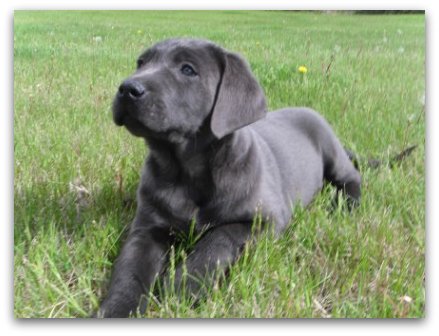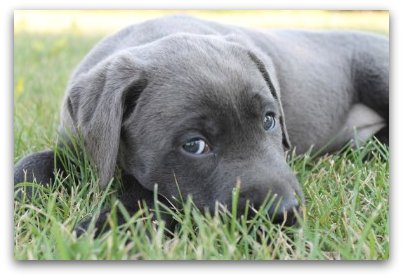Some people care about colour, while we are working towards breeding the healthiest, longer-lived, Labrador Retriever!
We think arguing over colour is ridiculous too... but here is our take..
To preface this discussion on colour, we do want to encourage readers not to purchase dogs from "colour breeders." Although detractors of dilute labradors accuse us of being colour breeders, we always breed first for quality, and 80% or more of our puppies are black and yellow.
If most or all of a breeder's dogs and puppies are fancy colours, they are breeding with the primary purpose of producing those specific coloured puppies in order to satisfy market demand for 'something unique.' This is done irrespective of the other qualities that should be bred for, and it encourages very poor breeding practices.
Breeders can either breed for quality or for colour. It's not possible to do both well, no matter what colour(s) a breeder is trying to produce. Responsible breeders just have to choose the best quality dogs, and let the colours of the puppies fall where they may. So no matter how much you may want your new puppy to be a specific colour, please think about the health of all the dogs being produced for their colour, and about the enduring health of the breed.

Some people take issue with dilute coloured labs (silver, charcoal, and champagne). Are they bored? Don't they have anything else to do with their time? We don't know. We have heard claims that the dilute gene which produces these colours is not native to the labrador retriever, and thus the labradors possessing this gene are not purebred, and should not be registered.
Our own research has brought us to understand that, genetically speaking, fancy colours such as silver, charcoal, and champagne are respectively chocolate, black, and yellow. These fancy colours simply have two copies of what is called the dilution gene. This is termed homozygous, and their genetic profile in this regard is "dd." However, due to pressure placed on the registries by breed clubs, they are registered in accordance with their base coat colours.
In breeds such as the Weimeraner, Munsterlander, Newfoundland, Chesapeake Bay Retriever, Labrador Retriever and Great Dane, the locus (location) of the gene responsible for the dilution of coat colours has been found, and its presence can be tested for. We have used the services of DDC Veterinary from the USA, as well as HealthGene, an Ontario based company, to test our own Labradors for this genetic trait. Below are links with more information and a comprehensive chart of the possible genotypes(genes that we carry, but you can not see) found in Labrador Retrievers, and the phenotypes (what you see) that coincide with each one.
Breeders who are opposed to dilute labradors often cite the Breed Standard as only including black, yellow, and chocolate labs, and argue that it thereby excludes the diluted phenotypes of these colours. Interestingly enough, the breed standard itself only permits labradors to be between 55-75 pounds, inclusive of both male and female weights. Most breeders who oppose dilute coloured labs, still breed oversized Labs. These giant labs do not come under scrutiny, even though they can be up to 70% larger than the breed standard’s highest allowable weight. Is there so much that sets apart a ‘tint’ of colour, from a ‘sizeable’ difference?
We personally like all sizes, shapes, and colours of labradors, and we prefer to select dogs based on health and temperament than to show favour because of colour - simply put, we love them all!
The registered Labrador breed has been recognized by the CKC for just over a century now. Originally in Canada, in the early 1900s, the only colour of Labrador accepted by the breed standard was black. Thirty-one years following the first Canadian registered Lab, a yellow female was finally accepted as pure bred, and only sixty-some years ago, a chocolate male Lab was permitted to be registered. Interestingly, the popularity of these different colours came long after their acceptance. With the dilute labradors, the public's interest fuels their acceptance.
So, "What's in a name? That which we call a rose, by any other name would smell as sweet."
We would agree with Shakespeare, and we will continue breeding for the love of labs, and not to perpetuate conflict. The day may come when fox red, white, silver, charcoal, and champagne colour dogs will be registered as their respective colours. Too many breeders and owners simply delight in these newer colours, and increased interest and enjoyment can only be good for the breed as a whole.
In the meantime, we are happy that our fancy colours are proven quality, registered purebred labs. We are content to focus our breeding program on developing the personality, trainability, and overall health of our lovely pooches. And for those pet owners and Labrador lovers who know that the heart is beneath his coat, we invite you to come and meet our lab-children, and decide for yourselves if books should be overlooked due to their covers!
Please feel free to do your own research, and discover everything for yourself. When you are ready, please contact us with questions you may have regarding your new pet's colour and registration. We are very proud of our whole canine family, regardless of their colour! We invite you to come and meet some of our black, chocolate, yellow, red, white, silver, charcoal, and champagne pooches, and see for yourself why we love them all so much!

Still want to read more......
